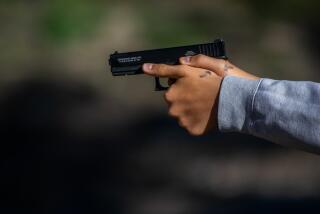Angst, Media, Peers--Shootings Defy Explanation
- Share via
The day after the Littleton shootings, a friend asked if I was going to weigh in on it. Sort of my job, I know; but I said no, then hemmed and hawed about why not.
The real reason was simple: I didn’t have a clue why it happened.
I feel almost sheepish saying so. I knew that would be unfashionable--everyone has a reason or set of reasons for why the two boys planned and carried out their murder-suicide mission.
Yet I didn’t.
I still don’t.
Early on, I asked one of my most respected sounding boards if it’s intellectually lazy to chalk up the tragedy to the notion that things, even historically horrible ones like this shooting, just happen. He said it was, noting there’s too much recent precedent.
Since then, I’ve waded through the pool of theories that have sprung from talk radio, TV and print: faulty parenting, peer pressure, absence of religion in schools, easy availability of guns, glorification of violence in pop culture, misplaced values in our secular society.
Surely, it has to be one of those, or some combination.
Maybe it is. I just can’t figure out which one. And individually, at least to my way of thinking, each one comes up short.
We’ve always had alienated high school boys. We’ve always had teens with simmering resentment and anger, secretly wanting to get even with their real or imagined oppressors.
So, I ask myself, what’s different from yesteryear when those kinds of boys didn’t bring pistols and rifles to school?
I go down the list, eliminating.
I don’t see how religion in schools would have prevented the Littleton shooting. I don’t see how anyone can empirically judge parenting and peer pressure. I don’t see how limiting guns would keep boys like these from finding them somehow, some way. Cultural “values” seem so nebulous.
The only one of the theories that holds water for me is that of the violence in our TV, movie and mass-media culture.
There’s no disputing that today’s young people have been blasted with more visual violence than previous generations. TV, videos, movies--we can’t dispute that today’s kids have seen all kinds of mayhem, some of it supposedly presented in comic form.
But then I come to a screeching halt.
Yes, the Littleton killers saw lots of violence, but so do tens of thousands of their peers.
How valid can it be to cite a culture of violence as Exhibit A when it causes an infinitesimal percentage of teens to act out? Would we apply that loose a standard to any other cause and effect? And especially when we can’t even prove that it does cause the behavior?
But to take it one step further, what if we could prove it? If we proved that video and movie violence causes a barely negligible fraction of our young people to do horrible things, should we ban it? And if we did, and if in a year or so another awful tragedy occurred, what, then, would we blame?
Even as a supposedly dyed-in-the-wool liberal in league with the secular humanists, it’s no skin off my nose if Hollywood quit making violent movies or TV shows. It probably would make for a better generation of young people.
But I just can’t get to the point where I think pop culture made the two Littleton teens go crazy.
Even if it seems unsatisfying for such a terrible crime, is it really so lazy to say that maybe there was just something inside them--some unidentifiable pathology we maybe can’t trace--that made them go haywire?
I don’t want to be intellectually lazy. I’ve applied as much rigor to the Littleton shootings as my brain allows.
If this sounds like the confession of a lazy thinker, so be it:
I’m still clueless.
*
Dana Parsons’ column appears Wednesday, Friday and Sunday. Readers can reach Parsons by calling (714) 966-7821 or by writing to him at the Times Orange County Edition, 1375 Sunflower Ave., Costa Mesa, CA 92626, or by e-mail to: dana.parsons@latimes.com.
More to Read
Sign up for Essential California
The most important California stories and recommendations in your inbox every morning.
You may occasionally receive promotional content from the Los Angeles Times.













